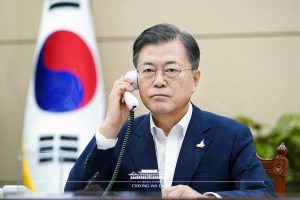With the resignation of Prime Minister Abe Shinzo in September due to health reasons, there was hope that Seoul and Tokyo might be able to improve cooperation, even if finding a way to resolve their dispute over compensation for the victims of Japan’s use of forced labor during World War II might be a bridge too far. So far, however, Japan’s change in leadership is having little effect on the broader dimensions in the relationship.
The dispute over forced labor has pushed relations between Seoul and Tokyo to new lows. The row began with a 2018 South Korean Supreme Court decision that upheld a lower court ruling awarding compensation to four South Koreans forced to work for Nippon Steel and Sumitomo Metal Corporation during World War II.
The situation escalated with Japan’s decision to place new national security restrictions on the export of three key materials for the production of semiconductors and displays, while also removing South Korea from its “white list” of trusted trade partners.
In response, South Korea removed Japan from its own “white list” of trading partners and threatened to withdraw from the two countries’ military information sharing agreement. The South Korean public has also taken to boycotting Japanese products. While the boycott has had only a minimal impact on overall bilateral trade, it has had a significant impact on some specific companies (like Uniqlo), South Korean tourism to Japan prior to the COVID-19 pandemic, and imports of products such as Japanese beer.
With the dispute taking its toll South Korean President Moon Jae-in reached out early to Prime Minister Suga Yoshihide to try and improve ties. In his initial call with Moon, Japan’s new prime minister expressed his belief that South Korea and Japan “cannot leave our current very difficult relations where they are now,” suggesting that the two countries work together on issues such as the coronavirus and North Korea. But Suga was also clear that Japan would not change its position on the issue of forced labor. Japan believes that all questions of compensation for its conduct during World War II and its longer colonial rule over the Korean peninsula were settled in the 1965 treaty that established Japan-South Korea diplomatic relations.
Despite Suga suggesting a firm position on the forced labor issue, the two countries recently held their first in-person working level meeting since the beginning of the pandemic to discuss the issue of forced labor and the trade restrictions tied to the dispute. After the meeting both sides largely hued to their public talking points on the issue of forced labor. Just prior South Korea and Japan denied that they were working on a resolution that would have involved companies from both countries providing compensation to the workers, suggesting that deeper discussions may be taking place behind the scenes.
That meeting was shortly followed by an appearance by Japanese Ambassador Tomita Koji at the Jeju Forum, where he said the two countries needed to “create an environment where the two leaders can meet and respond to that kind of expectation held by the people in both countries.” While the two countries have agreed to resume business travel, they are having trouble creating the environment that Tomita suggested.
Moon and Suga were schedule to meet at a trilateral summit with China in South Korea, but Suga has indicated that he will not attend the summit without a guarantee that South Korean courts will not liquidate assets from Nippon Steel to enforce the previous ruling requiring compensation.
Over the weekend, National Intelligence Service Director Park Jie-won paid a visit to Tokyo that included meetings with Suga, National Security Secretariat chief Kitamura Shigeru, and the secretary general of the ruling Liberal Democratic Party. In talks with Park, Suga referred to Japan-South Korea ties as “indispensable,” but also said that Seoul would have to make the first move to ease tensions. For his part, Park told reporters that the “[l]eaders of both South Korea and Japan agree on the necessity of resolving this issue, and I think we can well resolve this through talks.”
The forced labor dispute may also have been a factor in Japan’s decision to support Ngozi Okonjo-Iweala of Nigeria to be the next director-general of the WTO. Under normal circumstances Japan would have been unlikely to break with the United States in its support for South Korean Trade Minister Yoo Myung-he.
The prospect for continued, quiet efforts to reach an understanding on the issue of forced labor, however, could improve with former Vice President Joe Biden winning the White House. President-elect Biden has placed an emphasis on repairing U.S. alliances after the strains of the Trump administration and the United States has a strategic interest in Japan and South Korea being able to work together on a wider range of issues despite their disputes over historical issues. Once in office the Biden administration may try to play a more prominent role behind the scenes in helping Japan and South Korea work through their differences.
Suga’s premiership is still young and the challenges to date may be the growing pains of a new leader still asserting their authority. However, to build a future oriented relationship both countries will need to find a way to work on issues regardless of the issue over forced labor and invest political capital in the relationship. The United States can help in the process, but ultimately it is a decision that South Korea and Japan have to make.
































